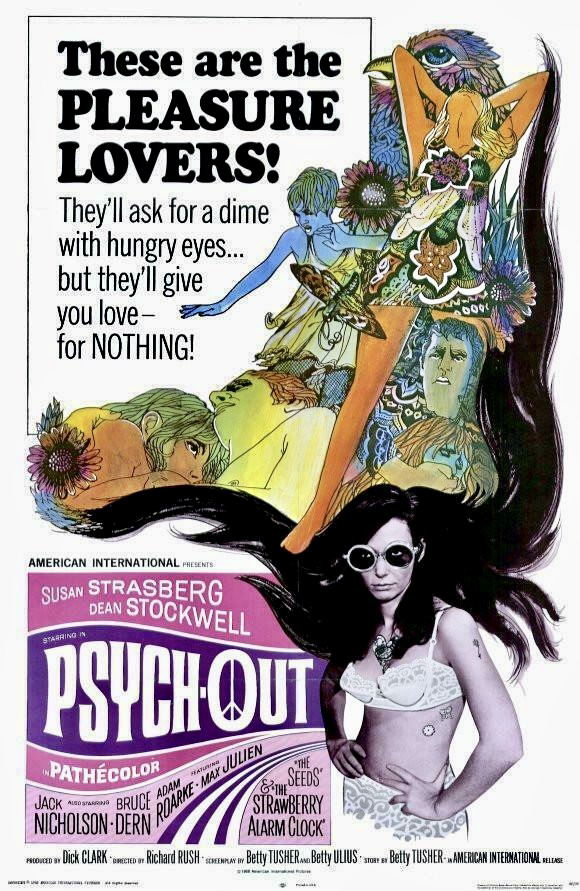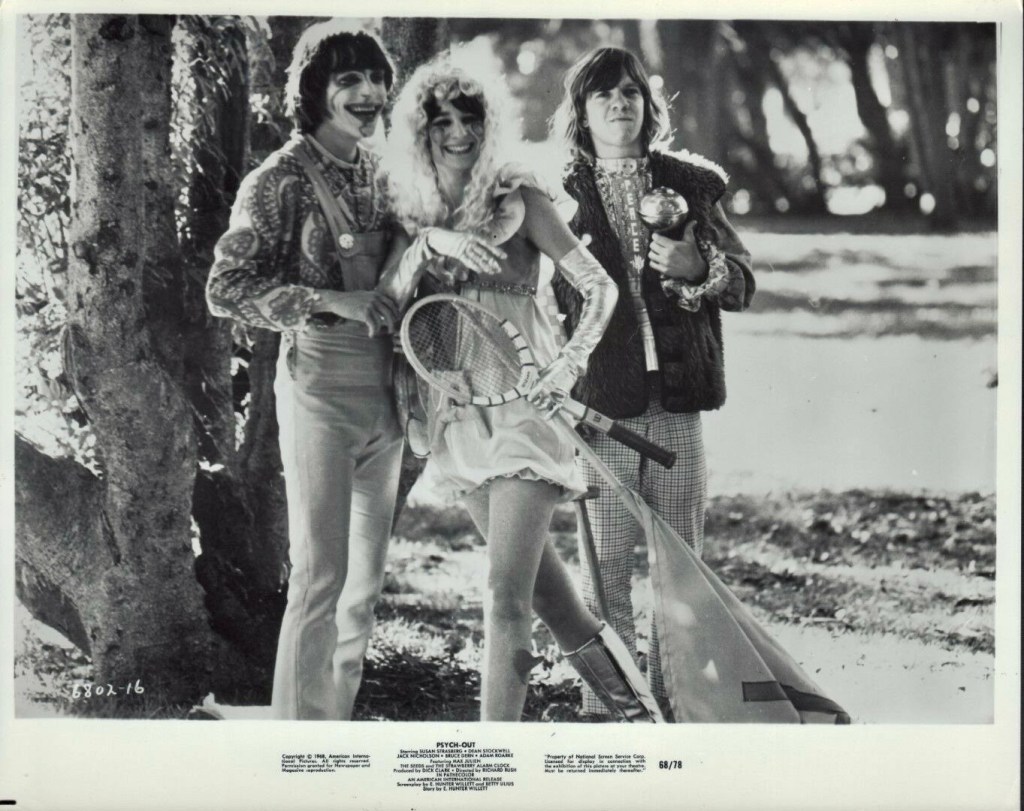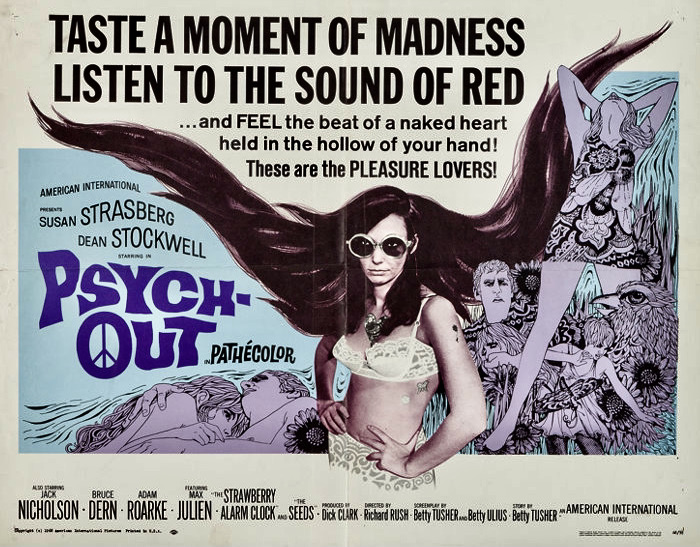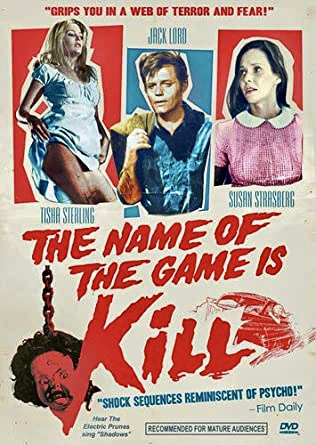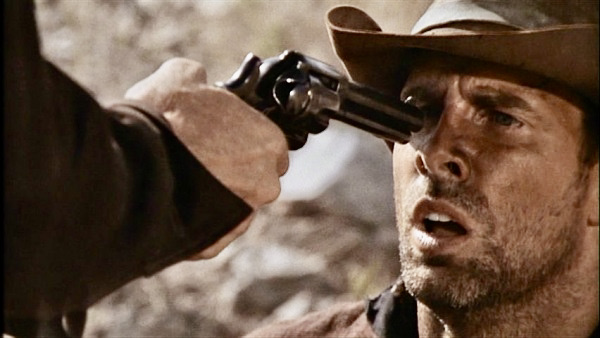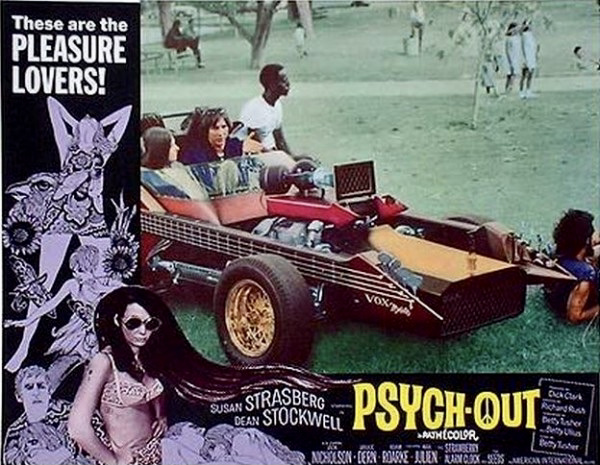The Hippie movement of the mid-sixties, which first flourished in San Francisco’s Haight-Ashbury neighborhood, has rarely been captured accurately in Hollywood feature films but there have been a few exceptions and one of the most notable is Psych-Out (1968). Filmed on location in San Francisco by cinematographer Laszlo Kovacs, under the director of Richard Rush (The Stunt Man, 1980), the American-International release captures a moment in time as well as any documentary on the same subject. On a visual level, you couldn’t ask for a better snapshot of the period from the clothes to the hair styles to the social behavior and counterculture attitude. Even the now dated hipster jargon, some of which will make you cringe, seems true to the period. If only the musical acts featured had been less a top forty fabrication than the real thing (Only The Seeds have any credibility among the groups on display), Psych-Out might have had a more significant impact upon its release.
Produced by American Bandstand host Dick Clark (it was his feature film debut as a producer), Psych-Out was made to capitalize on the success of Roger Corman’s previous counterculture film, The Trip (1967) and even recast two of the main actors, Susan Strasberg and Bruce Dern. Jack Nicholson was also involved with both productions. He wrote the screenplay for The Trip and also pitched his scenario for Psych-Out to director Rush who decided it was too experimental for a commercial movie. Nicholson’s script was first called Love is a Four Letter Word, then was changed to Love and Money and went through many revisions before being given to Betty Ulius for a final rewrite as The Love Children. American-International Pictures mogul Sam Arkoff didn’t like the title The Love Children because he felt audiences would assume the movie was about illegitimate children so it was switched to Psych-Out. Betty Tusher and E. Hunter Willett also contributed to the screenplay and Nicholson was cast in the role of Stoney, a part he wrote for himself.
Rush had previously directed Jack in Hells Angels on Wheels (1967). Rush would later remark, “Jack was a very clever writer, a very articulate writer…His script had an interesting verbalization of ideas. But it was too way out, too experimental, for the commercial mainstream, much too adventurous, different, cerebral.” Nicholson would end up receiving no screen credit for his script for Psych-Out but his performance in the film was noticed by many in Hollywood and led to better offers.

Nicholson had done such a good job of fleshing out the character of Stoney in the screenplay that his part and dialogue were barely altered in all of the many script revisions. Co-star Adam Roarke said, “Jack had packaged the film for himself…Thirty years ago, he knew how to package. Jack was way ahead of us at understanding the ways in which Hollywood was a business.”
Some autobiographical details from Nicholson’s own life were used for the Psych-Out script, such as his own experiences with therapy and LSD as well as his wife-at-the-time Sandra Knight, who had a particularly bad LSD reaction.
Susan Strasberg, who had previously played the wife of LSD experimentee Peter Fonda in The Trip, stars as Jenny, a 17-year-old deaf runaway who comes to San Francisco in search of her brother Steve (Dern). Known around town as “The Seeker,” Steve is a mysterious, enigmatic sculptor who remains elusive while Jenny is pursued by the authorities. She is soon befriended by members of the psychedelic band, Mumblin’ Jim, led by guitar star Stoney (Nicholson), and offered refuge in their crowded Victorian crash pad. Jenny is quickly immersed in the San Francisco hippie scene and is eventually reunited with her brother in a dramatic finale which involves a fire and a drug freakout.
The cast and crew members of Psych-Out noticed that the beatific vibe of San Francisco’s Summer of Love had already faded by the Fall when filming began. Commercialization of the hippie scene was already under way and many local residents resented the presence of the film crew, suspecting the worst of them. At one point, some film crew members were threatened with knives by local panhandlers. In response, director Rush hired Sonny Barger and some of his Hells Angels to patrol the shoot and act as their bodyguards during the filming of Psych-Out. Rush had worked with Barger previously on Hells Angels on Wheels.
Because the once topical script began to seem dated in the current climate of San Francisco’s changing counterculture, Rush ordered some on-the-spot rewriting, which reflected the more negative aspects of the scene, particularly the destructive effect of hard drugs and hallucinogens on young people.
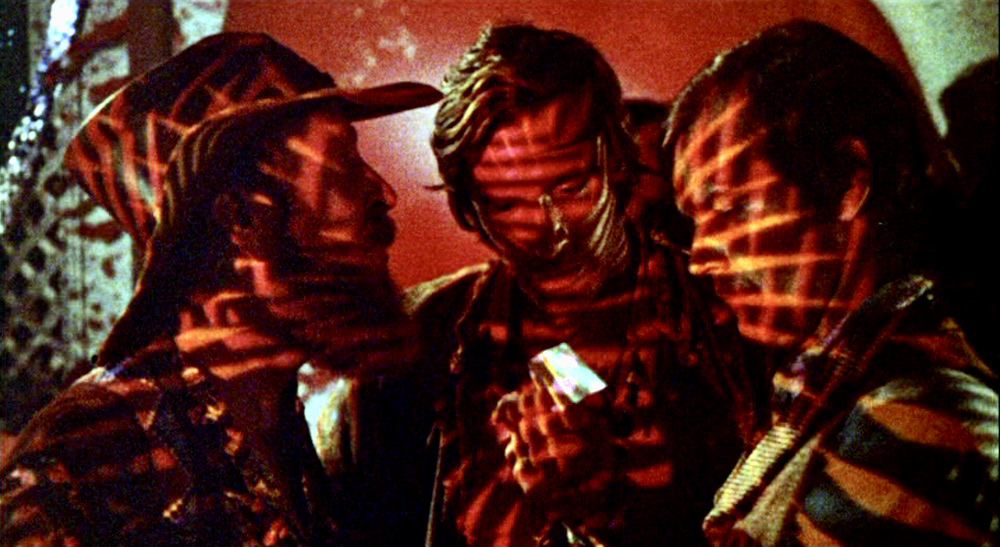
Nicholson and Susan Strasberg were both uncomfortable with their lovemaking scene in Psych-Out. According to Strasberg, “When we did our love scene, I was wearing a minidress and Jack wore his jeans and boots…I asked him if he could take his boots off. Peter Fonda had played his [role] in the nude in The Trip. Neither one of us wanted to show our thighs, but I had to.”
Strasberg was also uncomfortable during that scene because she and Jack were being watched intently by Nicholson’s jealous girlfriend Mimi Machu, who went by the screen name of I.J. Jefferson and had a supporting role in Psych-Out (as Pandora). Machu had also appeared with Jack in Hells Angels on Wheels and would also make appearances in Head, the Monkees’ feature film satire which Nicholson wrote, and Jack’s directorial debut, Drive, He Said (1971).

In Jack’s Life: A Biography of Jack Nicholson by Patrick McGilligan, Strasberg also recalled “I kind of admired the way Jack was able to bring everything down to the bottom line…He didn’t complicate things in the way that some actors do. When we were filming [the sex scene], for example, I discussed Reichian therapy with him. I had been in Reichian therapy, and so had Jack, I believe. Reich was a brilliant man with complex theories, far ahead of their time, about the bio-energy of the body. And I remember Jack distilling it all down to ‘You f*ck better.’
Co-star Bruce Dern credits most of his acting ability to learning his craft on his own in B-movies. “In Psych-Out,” he wrote in his autobiography, “Dick Rush was a serious filmmaker, but he had no conception of how to deal with an actor. He just didn’t know what to say to you; he’d just say, “Do it again,” or “Try it again,” and any kind of enthusiasm or energy he would mistake for talent, and he would love that. He was the most sensitive of the early directors that I worked for, although he wasn’t the best. Corman was far superior to him. So what you did was to learn to do it yourself. You learn how to survive and be real and be good and be interesting and exciting and to promote your career and continue on.”
Psych-Out was not one of Dean Stockwell’s favorite films. In an interview for Psychotronic Magazine, he said “I did not enjoy that very much. On the positive side, I think that was the first time I met Jack Nicholson, but that’s the only time I ever worked with him.”
Audiences seeing Psych-Out for the first time will be fascinated, amused or even embarrassed by the presence of so many up-and-coming actors and directors in such low-budget drive-in fare. Besides Nicholson (in a ponytail and not even bothering to fake his own guitar playing), Dern (in a wild man wig), and Strasberg, Dean Stockwell makes a memorable impression as Dave, the long-haired, headband-wearing guru of the group who plays devil’s advocate to Nicholson’s rock ‘n’ roll hero. Adam Roarke, who had already appeared in Hells Angels on Wheels (1967) with Nicholson, would go on to specialize in other biker flicks and exploitation films such as Frogs (1972) and Dirty Mary Crazy Larry (1974).
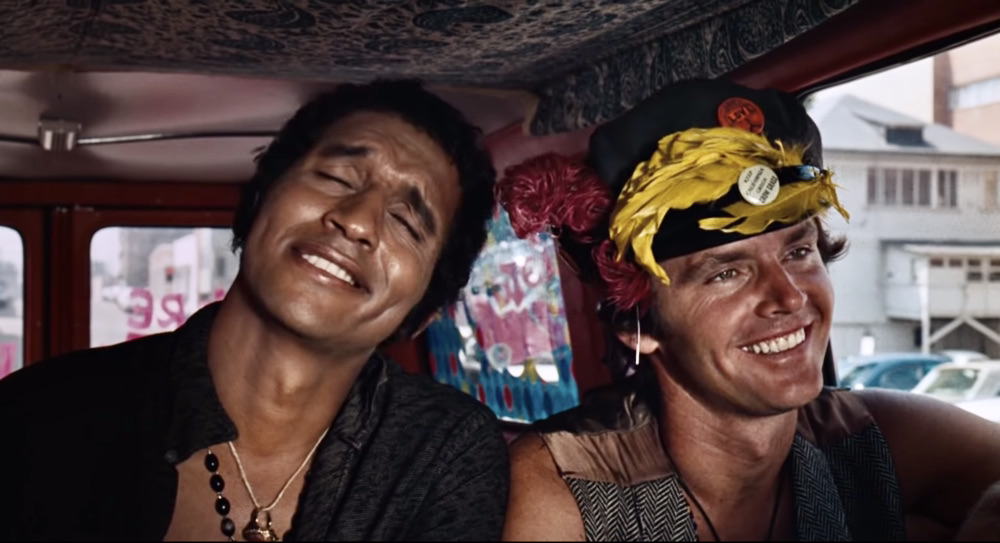
Max Julien, one of the most talented African-American actors of his generation, scored a cult hit with The Mack in 1973 and added producer and screenwriter to his credits with Cleopatra Jones (1973) and Thomasine & Bushrod (1974). Future directors Henry Jaglom (A Safe Place [1971], Sitting Ducks [1980]) and Garry Marshall (Young Doctors in Love [1982], Pretty Woman [1990]) also show up in supporting roles with Jaglom stealing the show as an artist with Elvis Presley-like sideburns who flips out on a hallucinogen and threatens people with power tools.
As previously noted, the music score for Psych-Out is a major disappointment with The Strawberry Alarm Clock, the one-hit wonder who recorded “Incense and Peppermints,” being given the showcase treatment in their number “Rainy Day Mushroom Pillow.” The other featured songs include “Ashbury Wednesday” by Boenzee Cryque, “Beads of Innocence” by The Storybook and “Two Fingers Pointing To You” by Sky Saxon of The Seeds.
Even though no one at American-International Pictures expected Psych-Out to find favor with any critics, it actually received favorable coverage from many mainstream critics such as Renata Adler of The New York Times who commented that the movie “has considerable elan” and noted, “What is most interesting, though, is that the demands of plot seem to make it necessary to superimpose the structure of a Western onto hippie life.” Variety was impressed the performances of the main actors, but also with the direction and cinematography: “Rush’s direction is quite exceptional. Considering what coin he had to play with, it is worthy of 20 times the apparent budget. Overlaps, transitions, chases and hallucinations are inventive, telling and lucid. Were he a foreigner – Canadian, British or French, per the vogue – he might be greeted by ‘auter! auter! cries. Leslie Kovacs’ fluid and responsive Pathecolor photography is first-rate.”
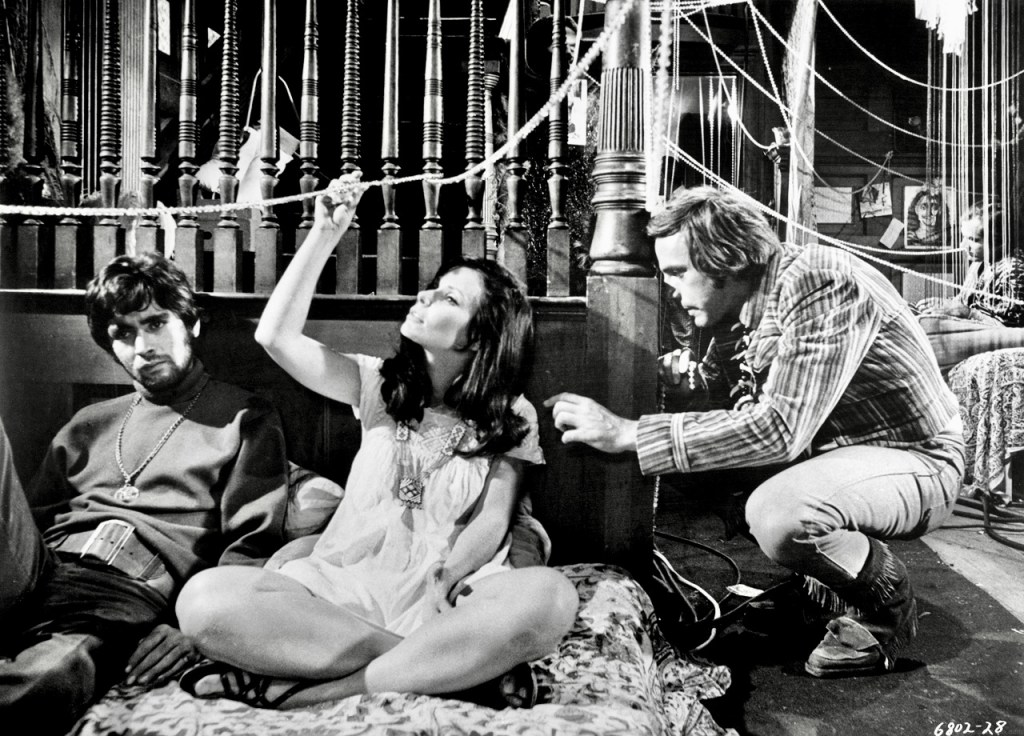
Of course, Psych-Out is now viewed as more of a camp classic by contemporary critics like David Petrie of TimeOut, who called it “a slam-bang compendium of every hippy cliché from the bad trip to the redneck rumble… But if you can accept the clichés and archaisms, as well as some third-rate acid rock from The Seeds and Strawberry Alarm Clock, there are compensations: some beautifully baroque performances (Dern and Stockwell in particular), Laszlo Kovacs’ effective visualisation of Strasberg’s bad STP trip, the spectacle (as irresistible as it is preposterous) of Jack Nicholson sporting lead guitar at the Fillmore.”

Additional Trivia on the film: The taglines on the poster for Psych-Out announced: “These are the Pleasure Lovers! They’ll ask for a dime with hungry eyes…but they’ll give you love – for NOTHING!” Other taglines for the film include “Taste a Moment of Madness…Listen to the Sound of Red” and “Have you ever TASTED FEAR or SMELLED MADNESS?”
Jack Nicholson made Psych-Out after an appearance on The Andy Griffith Show TV series but before his star-making turn in Easy Rider in 1968. At the time, he still considered himself a screenwriter more than an actor (even though he still struggled to win roles) and would go to work on the screenplay of Head for director Bob Rafelson immediately following Psych-Out.
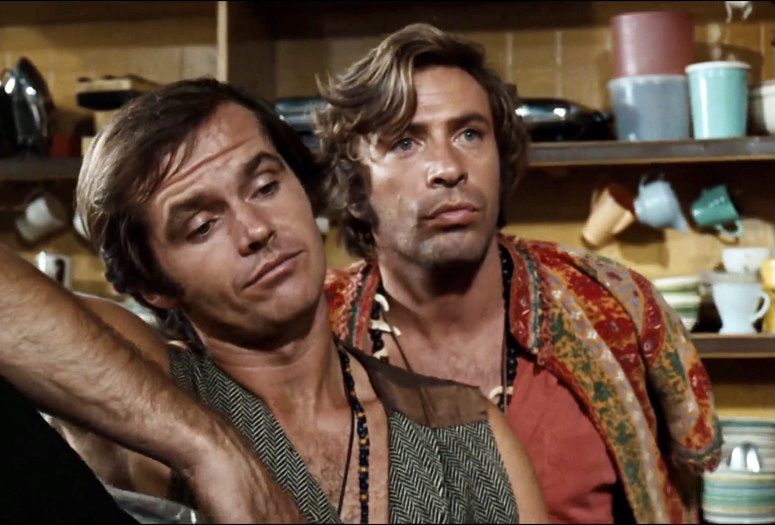
The daughter of New York City acting coach Lee Strasberg and stage actress Paula Strasberg, Susan Strasberg made her Broadway debut in the title role of The Diary of Anne Frank in 1955 and her film debut in 1955 with supporting roles in two films, Picnic and The Cobweb. After her marriage to actor Christopher Jones in 1965, Strasberg began appearing in more unconventional films (The Name of the Game is Kill, 1968) and B-movies such as The Trip (1967) and Psych-Out (1968) for AIP, which was also the studio that released Wild in the Streets (1968), starring Strasberg’s husband Jones in the lead. She died of breast cancer at the age of 60 in 1999.
During the early part of his film career, Bruce Dern was typecast as psychos or weirdos in many films and TV shows. Directly after making Psych-Out, he played one of several villains in the Clint Eastwood western, Hang ’em High (1968). He would begin to receive better film offers and marquee placement after his performance in the Oscar-winning They Shoot Horses, Don’t They? (1969) which led to major roles in Jack Nicholson’s directorial debut, Drive, He Said (1971), Silent Running (1972), The King of Marvin Gardens (1972), opposite Jack Nicholson, The Great Gatsby (1974), and Alfred Hitchcock’s Family Plot (1976).
Dean Stockwell enjoyed a highly successful career as a child actor at MGM and transitioned successfully into an adult career giving critically acclaimed performances in Compulsion (1959), Sons and Lovers (1960) and Long Day’s Journey into Night (1962) with Katharine Hepburn, Ralph Richardson and Jason Robards, Jr. Stockwell’s film career as a leading man faltered in the mid-sixties and he concentrated more on television work while occasionally accepting parts in offbeat films such as Psych-Out, The Dunwich Horror (1970) and The Last Movie (1971), directed by Dennis Hopper. Stockwell’s film career enjoyed a resurgence in the early eighties when he appeared in Wim Wenders’ critically acclaimed Paris, Texas and David Lynch’s Dune (both 1984). He later was featured in Lynch’s Blue Velvet (1986) and received a Best Supporting Actor nomination for Jonathan Demme’s farce, Married to the Mob (1988). His cult status was also given a boost by his regular appearance in the TV series, Quantum Leap (1989-1993).
Director Richard Rush (1929-2021) has had a very uneven career but is generally perceived as a strong action director, due to his work on several better-than-average exploitation films such as Hells Angels on Wheels (1967), starring Jack Nicholson. The Stunt Man (1980) is generally regarded as his best film and the pinnacle of his movie career.
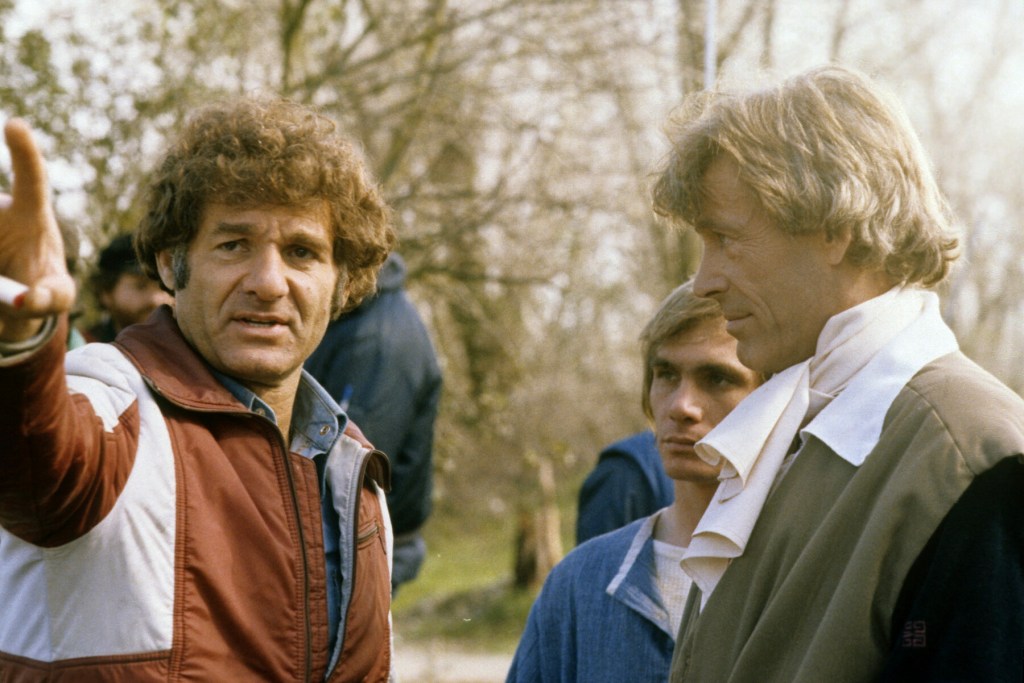
Cinematography Laszlo (aka Leslie) Kovacs (1933-2007), emigrated to the U.S. from Hungary with fellow cinematographer Vilmos Zsigmond in the late fifties and both found work in Hollywood, shooting low-budget features. Kovacs’ collaboration with director Rush began with A Man Called Dagger (1967) and continued for five more features, ending with Freebie and the Bean (1974). Kovacs was never nominated for an Oscar despite his acclaimed work on such films as Easy Rider (1969), Five Easy Pieces (1970), What’s Up, Doc? (1972), Paper Moon (1973), Shampoo (1975) and New York, New York (1977). He died in 2007 of an undisclosed illness.
Psych-Out was originally released as a DVD double feature with The Trip by MGM Home Entertainment but it finally made its Blu-Ray debut in February 2015, courtesy of Olive Films, which delivered an eye-popping transfer (sorry, no extra features).
*This is a revised and extended version of articles that originally appeared on the Turner Classic Movies website.
Other links of interest:
http://www.money-into-light.com/2017/10/an-interview-with-richard-rush-part-1.html
https://www.thebatterysf.com/article/the-haight-ashbury

